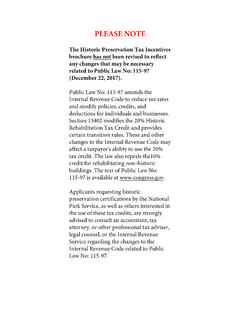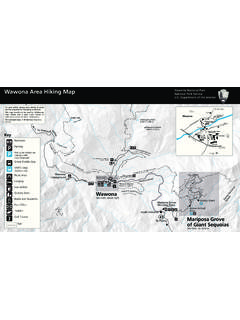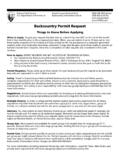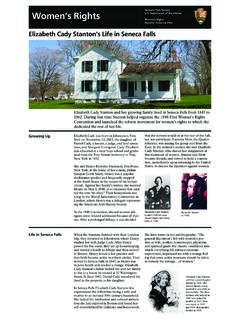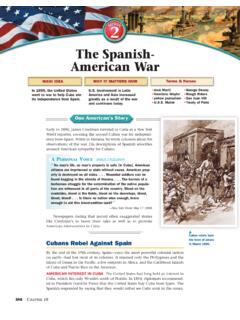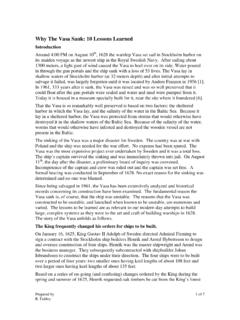Transcription of Slavery: Cause and Catalyst of the Civil War
1 Slavery: Cause and Catalyst of the Civil Department of the InteriorNational Park ServiceNPS/CUMBERLAND GAP NHPNPS COLLECTIONWhat caused the Civil War?A number of issues ignited the Civil War: states rights, the role of the federal government, the preservation of the Union,the economy; but all were inextricably bound to the institution of OF CONGRESSA lexander Stephens, Vice President of the Confederate States of AmericaAmong the many who did not share Alexander Stephen s beliefs on racial inequality was the firebrand Congressman from Pennsylvania, Thaddeus Stevens, who said, I can never acknowledge the right of slavery and chose to be buried in a remote cemetery that would also include African Americans, so his principles would be upheld, even in for ConflictThe role of slavery in bringing on the Civil War has been hotly debated for decades.
2 One important way of approaching the issue is to look at what contemporary observers had to say. In March 1861, Alexander H. Stephens, Vice President of the Confederates States of America, was quoted in the Savannah Republican: The new constitution has put at rest, forever, all the agitating questions relating to our peculiar institution African slavery as it exists amongst us, the proper status of the negro in our form of civilization. This was the immediate Cause of the late rupture and present revolution. Jefferson in his forecast, had anticipated this, as the rock upon which the old Union would split. He was right. What was conjecture with him, is now a realized fact.
3 [Our] foundations are laid, its cornerstone rests, upon the great truth that the negro is not equal to the white man; that slavery, subordination to the superior race is his natural and normal condition. Savannah Republican, March 21, 1861 Today, most professional historians agree with Stephens that slavery and the status of African Americans were at the heart of the crisis that plunged the into a Civil war from 1861 to 1865. That is not to say the average Confederate soldier fought to preserve slavery or the average Union soldier went to war to end slavery. Some fought on moral grounds. Some fought because they felt their way of life and prosperity were threatened.
4 Others fought to preserve the Union. Soldiers fight for many reasons notably to stay alive and support their comrades in arms. The North s goal in the beginning was the preservation of the Union, not emancipation. For the 180,000 African Americans who ultimately served the in the war, however, emancipation was the primary aim. NPS/HUGH BROWN1 NPS/RICHARD SCHLECHTThe roots of the crisis over slavery that gripped the nation in 1860-1861 go back well before the nation s founding. In 1619, slavery was introduced to Virginia, when a Dutch ship traded African slaves for food. Unable to find cheap labor from other sources, white settlers increasingly turned to slaves imported from Africa.
5 By the early 1700s, in British North America, slavery generally meant African slavery. Southern plantations using slave labor pro-duced the great export crops tobacco, rice, forest products, and indigo that made the American colonies prosperous. Many Northern merchants made their fortunes either in the slave trade or by exporting the products of slave labor. African slavery was central to the development of British North America. Although slavery existed in all 13 colonies at the start of the American Revolution in 1775, a number of Americans (especially those of African descent) sensed the contradiction between the Declaration of Independence s ringing claim of human equality and the existence of slavery.
6 Reacting to that contradiction, Northern states decided to phase out slavery following the Revolution. The future of slavery in the South was debated, and some held out the hope it would eventually disappear there as well. We hold these truths to be self-evident, that all men are created equal, that they are endowed by their Creator with certain unalienable Rights, that among these are Life, Liberty, and the Pursuit of Happiness. Declaration of Independence 2 LIBRARY OF CONGRESSLIBRARY OF CONGRESSLIBRARY OF CONGRESSS lave ship bringing Africans to Jamestown, Virginia3 NPS/RICHARD SCHLECHT4 Slavery and the Economy All realistic hope slavery might eventually die out in the South ended when Massachusetts native Eli Whitney invented the cotton gin a simple machine that enabled textile mills to use the type of cotton grown in most of the South.
7 At the same time, the world demand for cotton exploded. By 1840, cotton produced in the American South earned more money than all other exports combined. Many white Southerners came to believe that the viability of cotton as a crop depended on slave labor. Over time, most took for granted that their prosperity, even their way of life, was inseparable from African was not the only source of dispute. The North and South were very different in nature, and wanted different things from their government. In the North, society was fast becoming industrial. Immigrants in search of work were arriving by the thousands. In addition, women began to leave the farms seeking opportunity in the cities.
8 Immigrants and women provided an abundant source of inexpensive labor to fuel the factories. Industrialization increased the amount of textiles produced and therefore, the demand for more slave labor. Entrepreneurs looking to develop these new industries demanded protection from cheap manufactured goods imported from and immigrants at New England mills (Homer Lithograph)NPS/LOWELL NHP5 The South, on the other hand, remained a region of small towns and large plantations. The great cotton empire depended on slave labor and cheap European imports. Southerners began to fear that if the North ever gained control in Congress, it would create taxes on imports, known as tariffs, which would ruin the John C.
9 Calhoun, Vice President under John Quincy Adams and Andrew Jackson, was among the first to voice this concern. Though he opposed secession, Calhoun argued that a state could protect its interests by simply nullifying any act by the federal government it considered unconstitutional and unfair. Southerners began to rely on the concept of states sovereignty as a means of self-protection. 6 Slave quarters at Melrose NHPF ormerly enslaved woman, Jane Johnson at Melrose Estate, Natchez, Mississippi, circa 1905 NPS/NATCHEZ NHP78 Slavery and the Constitution When the Constitution was written in 1787, the interests of slaveholders and those who profited from slavery could not be ignored.
10 Although slaves could not vote, white Southerners argued slave labor contributed greatly to the nation s wealth. The Constitution, therefore, provided for counting each slave as 3/5 of a person in the census for the purposes of representation in Congress and the electoral college. The clause gave the South a role in the national government far greater than representation based on its free population alone would have allowed. Although the Constitution did not use the term slavery, Article IV provided for the return of escaping persons held to service or labor such as fugitive slaves. Article I provided that the slave trade would end 20 years after the Constitution was ratified, which was in 1808.
